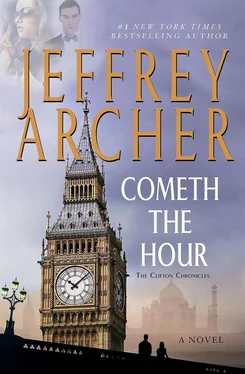“Why didn’t she tell me that when she was alive?” said Emma. “Perhaps she thought you were too busy to listen, my darling.” “I can’t wait to hear what she has to say to you, Dad.”
And finally, my beloved son, Harry. For a mother to say that she is proud of her son is only human. However, I could never have dreamed of the happiness your success, both as a novelist and as a campaigner for those who don’t know freedom, would bring me.
Although I believe, as I know you do, that your courageous fight for Anatoly Babakov is your finest achievement, I know you will not be satisfied until he is a free man and can join his wife in America.
Have you ever told Emma you turned down a knighthood, an honor you would not consider accepting while Babakov was still in prison? I am proud of you for that, even though I would have enjoyed hearing my son addressed as Sir Harry.
“You never told me,” said Emma.
“I never told anyone,” said Harry. “Giles must have somehow found out.” He returned to the letter.
And now to William Warwick, who has entertained so many people, for so many years. Harry, perhaps it’s time for him to retire, so that you can finally stretch yourself to reach even greater heights. You told me once, many years ago, the rough outline of a novel you had always wanted to write, but had never got around to. You never got around to it because Harold Guinzburg, that wicked old publisher, kept tempting you with bigger and bigger advances. Perhaps the time has now come for you to write a book that will bring happiness for generations to come, whose reputation will outlive any bestseller list and make it possible for you to join that handful of authors whose names will never die.
Rant over. All that is left for me to say is thank you for making my final years so peaceful, comfortable and enjoyable. And when the time comes for any of you to write a similar letter, please don’t be like me and feel you could have done so much more with your life.
Your loving mother,
Maisie
Harry poured three glasses of the ’57 Merlot and handed one each to Emma and Seb. He raised his own glass and said, “To Maisie. Shrewd old thing.”
“To Maisie,” repeated Emma and Seb, raising their glasses.
“Ah, and I nearly forgot,” said Harry, picking the letter back up. “There’s a postscript.”
P.S. Please remember me to your dear friend Giles, who can consider himself lucky that I didn’t write about him, because had I done so, it would have been a far longer letter.
“Good morning, Mrs. Clifton. My name is Eddie Lister. We met briefly at your mother-in-law’s funeral, but there’s no reason you should remember me.”
“How did you know Maisie, Mr. Lister?” Emma asked, because he was right, she couldn’t place him.
“I’m chairman of the governors of the Bristol Royal Infirmary. She was one of our volunteers and will be sadly missed by patients and staff alike.”
“I had no idea,” said Emma. “What did she do?”
“She was in charge of the lending library and organized the daily rota for the book trolley to be taken around the wards. More people read books at BRI than in almost any other hospital in the country.”
“Why am I not surprised,” said Emma. “Are you looking for someone to replace her, because if you are, I’d certainly be happy to do so.”
“No, thank you, Mrs. Clifton, that isn’t the reason I’m calling.”
“But I’m confident I could organize the library and, what’s more, my family has had a close association with the hospital for many years. My grandfather, Sir Walter Barrington, was chairman of the governors, my husband was nursed back to health at BRI after being seriously wounded by a German landmine in 1945, and my mother spent the last months of her life there under the care of Dr. Raeburn. What’s more, I was born at the Royal Infirmary.”
“I’m impressed, Mrs. Clifton, but I still don’t think you’re the right person to organize the book trolley.”
“May I ask why you won’t even consider me?”
“Because I was rather hoping you’d agree to become a governor of the hospital.”
Emma was momentarily silenced. “I’m not altogether sure I know what a hospital governor does.”
“Every major NHS hospital — and ours is one of the largest in the country — has a board of governors drawn from the local community.”
“And what would my responsibilities be?”
“We hold a meeting every quarter, and I also invite each trustee to take an interest in one particular department of the hospital. I thought nursing might appeal to you. Our senior matron, Mima Puddicombe, represents the two thousand nurses who work full- or part-time at BRI. I should mention that if you agree to become a governor, there is no remuneration or expenses. I realize you are a busy woman, Mrs. Clifton, with many responsibilities, but I do hope you’ll give some thought to my proposal before you make—”
“I’ve thought about it.”
Mr. Lister sighed. “Yes, I feared you’d be too busy with all your other commitments, and of course I thoroughly understand—”
“I’d be delighted to become a governor of the hospital, Mr. Chairman. When do I start?”
“Marshal Koshevoi is becoming somewhat restless, Comrade Brandt. He thinks it’s time you came up with something a little more tangible. After all, you’ve been living with Barrington for the past year and all you’ve produced so far is the minutes of the Labour Party’s weekly meetings in the House of Lords. Hardly illuminating.”
“I have to be careful, comrade director,” said Karin as they walked arm in arm down a quiet country lane. “If Barrington were to become suspicious and my cover was blown, all our painstaking preparations would have been for nothing. And while he’s in opposition, and not a member of the government, he isn’t privy to what’s going on in Whitehall. But if the Labour Party wins the next election, and Barrington is confident they will, that could all change overnight. And if I recall your exact words when I took on this assignment, ‘We are not in a hurry, we’re in this for the long game.’”
“That is still the case, comrade. However, I’m becoming concerned that you might be enjoying your bourgeois existence as Barrington’s mistress a little too much, and have forgotten where your true allegiance lies.”
“I joined the party when I was still at school, comrade director, and have always been dedicated to our cause. You have no reason to question my loyalty.”
Tap, tap, tap. They fell silent when they saw an elderly gentleman approaching.
“Good afternoon, colonel,” said Pengelly.
“Afternoon, John. How nice to see your daughter again,” said the old man, raising his hat.
“Thank you, colonel,” said Pengelly. “She’s just down for the day, and we thought a breath of country air wouldn’t do us any harm.”
“Capital,” said the colonel. “I rarely miss my constitutional. Gets me out of the house. Well, must be getting along, or the memsahib will be wondering where I am.”
“Of course, sir.” Pengelly didn’t speak again until they could no longer hear the tap, tap, tap of the colonel’s walking stick. “Has Barrington asked you to marry him?” he asked, taking Karin by surprise.
“No, comrade director, he has not. After two failed marriages, I don’t think he’ll be rushing into a third.”
“Perhaps if you were to become pregnant?” he said as they turned off the road and followed a path that led to a disused tin mine.
“What use would I be to the party then, if I had to spend all my time bringing up a child? I’m a trained operative, not a babysitter.”
Читать дальше












